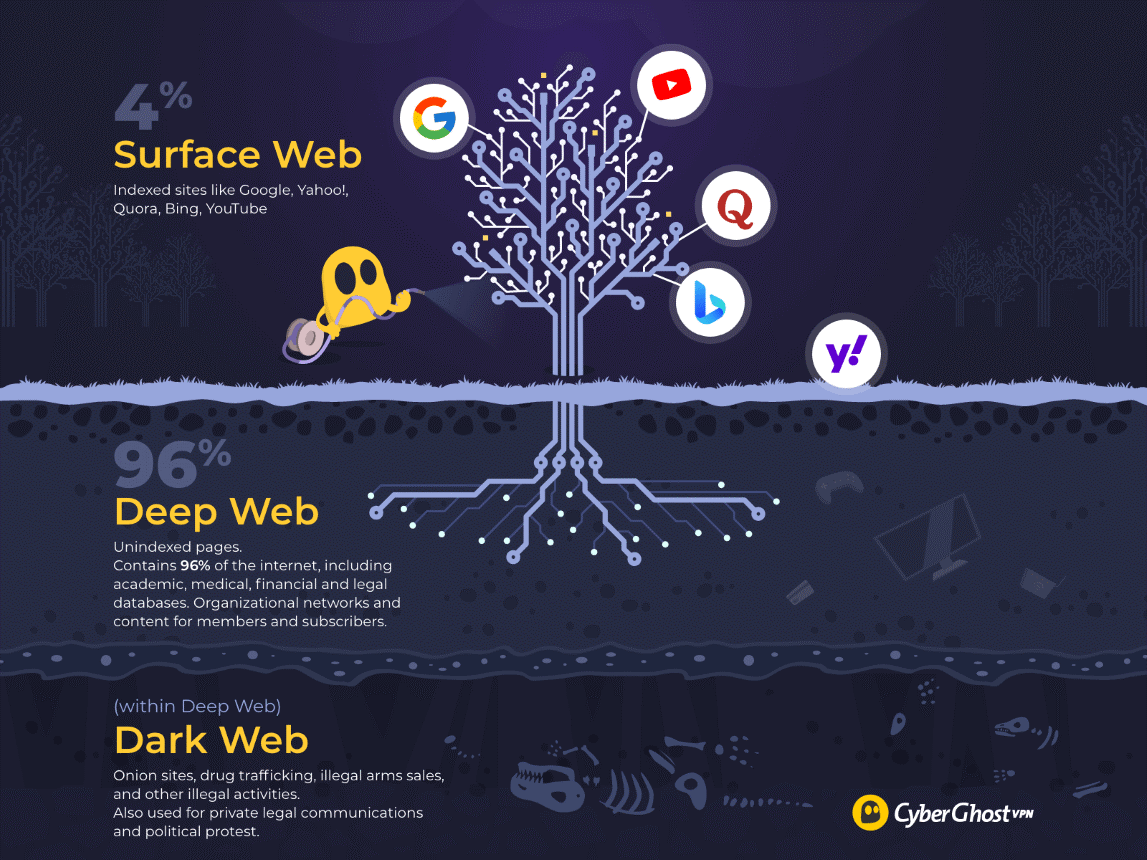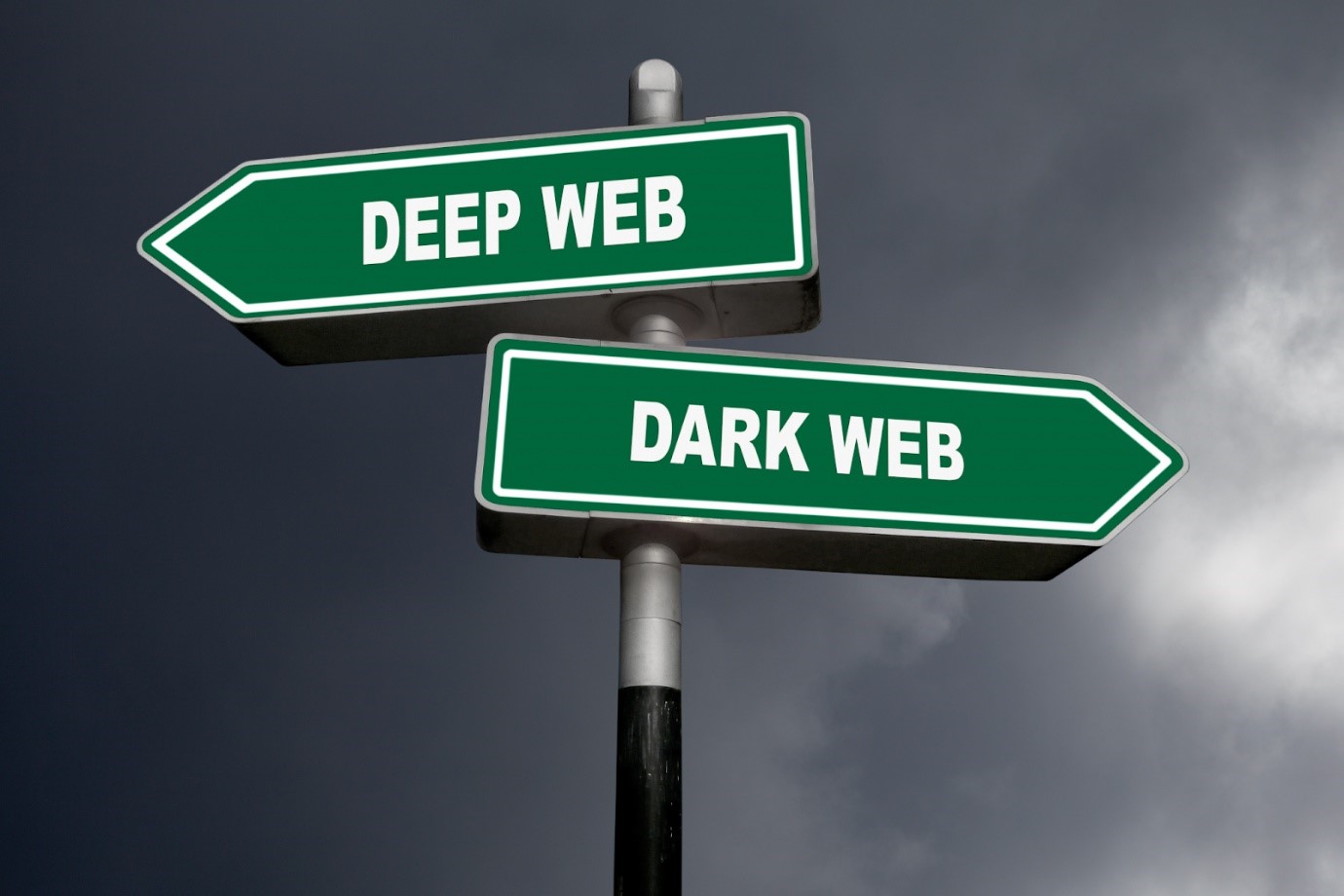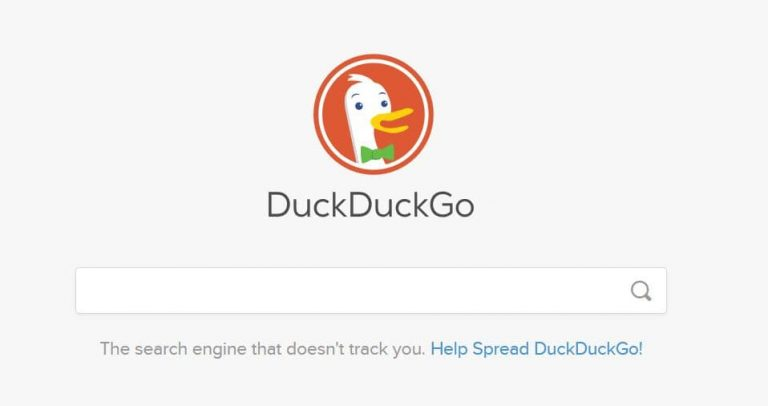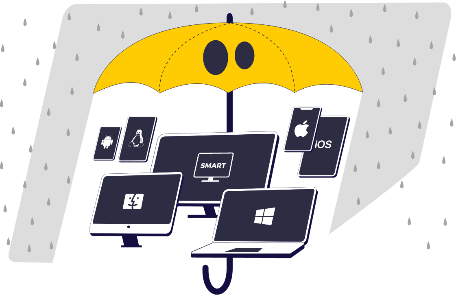The internet is like a gigantic iceberg. When you’re looking from above the surface, it’s hard to get a clear view of what lies underneath. The deep web and the dark web are parts of the internet that lie below the surface and many get confused between the two. You might even think they’re one and the same!
As of December 2021, the total number of indexed pages reached 3.3 billion, and that’s just the tip of the iceberg.
Let’s dive in and take a closer look at the differences between surface web vs deep web. Oh, and before you get your explorer boots on, remember that going on the deep web can be dangerous. Get CyberGhost VPN to protect yourself online.
What Is the Indexed Web?
When a site owner publishes a webpage, search engines read, analyze, and register it in their database. Once a search engine adds the webpage to its database, it has indexed it and anyone can look it up. Indexing usually takes place through an automatic process called crawling.
On the contrary, any page that you can’t find with a search engine isn’t indexed. The publisher might’ve prevented crawlers from indexing a web page for many reasons.
Understanding the 3 Layers of the Internet
You need to know the structure of the entire web to better understand the difference between the deep web and dark web. It contains three layers: the surface web, the deep web, and the dark web.

The deeper you go, the darker it gets.
Surface Web
All websites you normally access via Google, Yahoo, or Bing make up the surface web. This includes Facebook, Instagram, Twitter, and all other social media platforms; streaming services such as YouTube and Netflix: E-commerce sites like Amazon and eBay; or blogs, for example, the top Tor websites you can visit safely. The list goes on, but you get the idea.
The surface web alone can seem like a massive network of sites. But here’s the surprise: the visible web makes up a meager 5% of the World Wide Web.
Deep Web
The deep web contains websites that are not indexed by search engines.
Deep sites won’t turn up on normal search engines like Google or Bing. To access these pages, you need their exact URL or link. You have to input the address in a browser and a server retrieves it for you directly from the source. Some pages may require you to enter login credentials before you can access them.
Unindexed pages don’t necessarily have dark content. These could very well be part of mainstream sites such as a website’s admin login, subscription page, or unlisted YouTube videos.
According to stats, the deep web is the fastest-growing category on the internet and makes up around 90% of all web pages. That said, all of us have surfed the deep web at some point. Whether through a private Facebook profile, a company site, or just another blog post that never found its way to search engine result pages.

Dark Web
The dark web is a part of the deep web, only that it’s much deeper and often completely inaccessible to the average internet surfer. The darknet is usually encrypted. You can only access it if you have special software or authorization and know exactly where to look.
The dark web, much like the surface web, is also indexed, but not on regular search engines. It has special search engines like DuckDuckGo, Not Evil, Candle, and SearX. But you can’t access the dark web with an ordinary browser.

For that you’ll need the Tor browser. It is a special browsing tool that does not track your browsing history and helps you surf the dark web. Although Tor encrypts your connection, its encryption standards are pretty low and a third-party could easily track your internet activity. Improve your privacy on the dark web with CyberGhost VPN’s unbreakable encryption.
When most people talk about the shady part of the internet, they’re referring to the dark web. The term can often be interchangeably used with deep web, but you’ll find quite a few differences between them.
8 Differences Between Deep Web and Dark Web
| Deep Web | Dark Web |
| The deep web is a part of the World Wide Web that search engines don’t index. | The dark web is a smaller part of the deep web. Owners intentionally hide dark sites from regular search engines. |
| You can access deep sites if you know the exact URL, click on a link, or have authority to access them. | You can only access dark sites with special browsing softwares like Tor Browser. |
| It is much bigger than the surface internet. | It’s a very small part of the deep web. The exact number of dark sites is unknown. |
| Deep sites are usually legal. | Dark sites usually illicit illegal activities. Some also facilitate legal activities that require anonymity. |
| You can access the deep web securely with a VPN. | Install CyberGhost VPN to access dark sites securely. |
| These sites don’t normally use obfuscated URLs. | Dark sites use obfuscated URLs. |
| Data on the deep web isn’t usually encrypted. Authorities, Internet Service Providers, or cybercriminals can track users’ identities and locations. | The dark web is encrypted. But Tor network encryption is weak and you can still be tracked if you’re not using a VPN. |
| Domains end with .com, .org, .edu, or other common extensions. | Domains end with .onion |
The differences mentioned above are enough for an overview, but it’s the contents that set the two parts of the internet apart from each other. Let’s go over what you can find on the deep and the dark web.
What Kind of Content Can You Find on the Deep Web?
Are you wondering how to access the deep web? Chances are you already use a deep website daily. Your college website account, online library, or the project management app your employer uses are all part of the deep web. These are examples of databases and intranets that make up a large part of the hidden web.

A database can be a public or private file collection that’s not connected to any other part of the internet. It can be anything from academic information, medical records, legal documents, research documents, government resources, or multilingual databases.
Intranets are small private networks within companies, educational institutions, or government agencies used for communications and day-to-day business. The content of these websites is clean and safe at large.
As you venture deeper, you might start to come across borderline illicit content like pirated music and movies. You can also find sites to access content that’s not available in your region. You can also stumble upon politically radical or extremist forums and other disturbing content.
Since you can access the deep web via regular browsers, you never know when a click takes you to a potentially dangerous place. This is why we recommend you use a VPN to protect your digital identity at all times.
What Can You Find on the Dark Web?
The dark web is notorious for its shady reputation, and not everything on it is illegal. Journalists, whistleblowers, or military and intelligence agencies also use dark web frameworks for secret communications.
The vast majority of dark websites still host illegal content. Here’s a list of what dark sites reportedly hold. (Trigger Warning: The following content may be disturbing to some readers.)
-
-
-
-
- Drug trafficking.
- Illegal weapons.
- Dark web software.
- 3D blueprints.
- Hidden Wiki portal (Alleged ‘original Wikipedia’).
- Explicit content.
- Wikileaks site: Wikileaks hosts a site on the darknet.
- Rare/Banned literature: Books and research banned by governments.
- Cryptocurrency scams: Scam sites attempting to sell various illegal stuff.
-
-
-
The Silk Road, a dark marketplace taken down in 2013, was one of the most popular dark websites. It’s one of the first examples of how easy it was for criminals to buy drugs, forged documents, and weapons on the internet. Numerous smaller illegal markets have emerged since.
You can’t directly find these links and for good reason. I don’t recommend you go on the dark web but if your curiosity still has the best of you, you’d need special search engines to find websites on the dark web. Before you continue, make sure to use CyberGhost VPN to protect yourself against spying eyes and cybercriminals.
Search Engines to Surf the Dark Web
Sites on the dark web have really lengthy and concealed URLs. You can’t easily remember these .onion addresses. So just as Google lets you search for stuff on the surface internet, the dark web has its own search engines.
Here are some of the most used private search engines for the dark web:
- DuckDuckGo
- notEvil
- Candle
- Ahmia.fi
- Torch
You should be extremely cautious if you plan on using any of these search engines. You never know what you’re going to find from a single search.
You might stumble very close to illegal activities. That brings me to the very question, is it illegal to access the dark web?
Is It Safe and Legal to Access the Dark Web?
Surfing the internet with Tor or a similar encrypted browser is completely legal. Similarly, nothing’s wrong with accessing non-indexed deep web pages. Trying to access the dark web is legal too.
Engaging in activities such as buying drugs, weapons, and sourcing fake passports and documents is illegal. It is legal to surf the dark web as long as you don’t commit a crime punishable by law.
That said, the dark web is full of cybercriminals waiting for internet users to fall into their traps. You must be extremely cautious to avoid scams. Get CyberGhost VPN to hide your IP address and ensure you’re safer while browsing the internet.
Make sure to follow these precautionary measures to stay out of trouble:
-
- 🦺 Use a VPN for protection against network attacks and to surf with more privacy.
- 🦺 Don’t visit illegal websites.
- 🦺 Don’t download anything from dark sites.
- 🦺 Access the dark web only if you have to.
- 🦺 Trust no one on the dark web.
- 🦺 Disconnect or cover your camera.
- 🦺 Disable java scripts for extra protection.
- 🦺 Don’t use any torrenting service when on a dark site.
Use CyberGhost VPN to Stay Safe on the Dark Web
As they say, don’t trust anyone on the dark web. Not even the Tor browser. Keep your digital identity safe and surf with improved privacy with CyberGhost VPN.
 A VPN encrypts your connection to the internet as a whole, regardless of whether you are on the surface web or the dark web. You can think of it as a 360-degree protection shield. No matter what you’re doing, you’re always protected.
A VPN encrypts your connection to the internet as a whole, regardless of whether you are on the surface web or the dark web. You can think of it as a 360-degree protection shield. No matter what you’re doing, you’re always protected.
Apart from the military-grade encryption CyberGhost VPN uses to secure your connection, it masks your IP address with that of the VPN server you’re connected to. This means no one can see where you’re located or who you are. Not even CyberGhost. You can choose from the most advanced VPN protocols like OpenVPN, IKEv2, WireGuard® or Layer to Tunneling Protocol to keep yourself safe from malware and network attacks.
Final Thoughts
Although many use the two terms interchangeably, quite a few things set the deep web and dark web apart from each other. The deep web comprises sites that are just not indexed. You can access them easily with an ordinary browser.
The dark web is where the shady sites are. You can only access it via Tor and special search engines. Just to hammer it home, don’t go on the dark web unless you absolutely need to. Download CyberGhost VPN to protect your device with a foolproof security layer when you’re connected to the internet.
FAQ
Deep web constitutes all web pages that aren’t indexed on regular search engines. The dark web is a subset of the former and is intentionally hidden from the rest of the internet. The majority of deep websites don’t host illegal content while most dark sites host criminal activities.
The Silk Road was an illegal marketplace for drugs, weapons, fake documents, and other illicit stuff. It was a part of the dark web and operated on a hidden Tor network.
A few websites claim shadow web is a deeper layer of the internet that hosts heinous criminal activities. But according to experts, it’s nothing more than a scam. The dark web is, in fact, the deepest part of the internet.
It’s not illegal to use a Tor browser to access the dark internet. That said, participating in illegal online activities is a crime. You can surf dark sites legally as long as you don’t try to buy or sell anything illegal. Accessing some websites can be incriminating if authorities manage to trace it back to you even without any purchase.
You can only access it with a special browser like Tor. You also need an exact web address or authentic URL dark web directory. You should always use CyberGhost VPN to protect yourself before diving in.
Deep, deeper, deepest. The shadow web is allegedly an even deeper layer of the internet than the dark web. It’s known to host even darker criminal activity than the rest of the dark web. Experts claim it’s only a rumor.
A large part of the deep web is safe to surf, but you can never be completely sure. This is why we recommend you connect to a VPN to hide your IP address and surf the deep web privately and safely.



Leave a comment
Philip
Posted on 30/05/2023 at 18:31
Just want to leave a simple Thank You for this article.
Ghostie
Posted on 05/06/2023 at 10:53
You made our day!